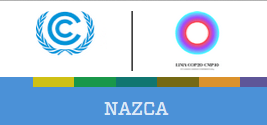 22 April 2015: To coincide with Earth Day, over 500 new city actions have been added to the Non-State Actor Zone for Climate Action (NAZCA) portal, which was launched at the UN Climate Change Conference in Lima, Peru, in December 2014. NAZCA, a UNFCCC-hosted website, showcases actions of non-state actors, including municipalities, regions and investors, and aims to help build momentum for a global climate agreement in Paris in December 2015. Currently, 400 cities, 71 subnational regions and 264 companies are taking 1514 climate-related actions listed on the NAZCA portal.
22 April 2015: To coincide with Earth Day, over 500 new city actions have been added to the Non-State Actor Zone for Climate Action (NAZCA) portal, which was launched at the UN Climate Change Conference in Lima, Peru, in December 2014. NAZCA, a UNFCCC-hosted website, showcases actions of non-state actors, including municipalities, regions and investors, and aims to help build momentum for a global climate agreement in Paris in December 2015. Currently, 400 cities, 71 subnational regions and 264 companies are taking 1514 climate-related actions listed on the NAZCA portal.
Amsterdam, Rio de Janeiro and Yokohama are among the cities that have communicated actions and targets, including those related to energy efficiency, deployment of renewables, green procurement and adaptation. While cities produce approximately 70% of energy-related emissions, they are also vulnerable to climate change, especially those on or in the vicinity of coastlines.
UNFCCC Executive Secretary Christiana Figueres said that by demonstrating action on NAZCA, cities can support and catalyze greater ambition by governments. She highlighted the collaborative work between NAZCA and programmes, such as the carbon Climate Registry, the CDP and the Compact of Mayors.
Examples of city targets include: Boston aims to reduce community-wide carbon emissions by 80% by 2050 over 1990 levels through, inter alia, building retrofits, onsite renewable energy installations, and improved waste and industrial pollution management; and Jakarta aims to reduce emissions from government operations by 30% from 2005 to 2030 through, inter alia, energy efficient lighting, solar-powered streetlights, and landfill gas capture and power generation.
Many of the actions, including the Compact of States and Regions, the Carbon Neutral Cities Alliance and the Compact of Mayors, are being undertaken in partnership with governments, organizations and international bodies, including the UN.
The Portal is also showcasing several initiatives under the Lima-Paris Action Agenda, which aims to catalyze action on climate change by governments and non-state actors before 2020, when the new global agreement is expected to enter into force, and after 2020. Many of these initiatives emerged from the UN Secretary-General’s Climate Summit in September 2014, including: the Low-Carbon Sustainable Rail Transport Challenge; Removing Commodity-Drive Deforestation from Supply Chains; and the Global Energy Efficiency Accelerator Platform. [NAZCA Portal] [UNFCCC Website] [Lima-Paris Action Agenda] [IISD RS Story on Mother Earth Day]